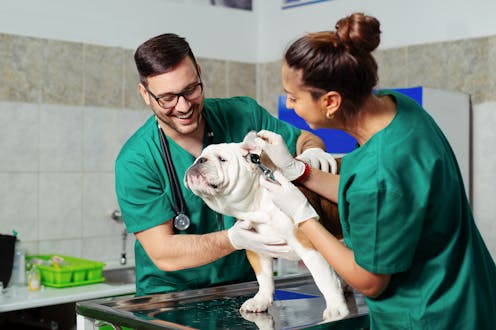Fewer men are choosing to become vets – ‘male flight’ could be the reason
- Written by Hamish Morrin, Veterinary Lecturer in Clinical Communication Skills, University of Central Lancashire

If you take your dog, cat or fish to see a vet in the UK, the person who treats them is likely to be a woman. According to the Royal College of Veterinary Surgeons[1], 61% of current UK vets are female. University admissions are even more skewed. Among vets who had recently qualified, nearly 80% were female.
This wasn’t always the case. In the 1930s, when James Herriot – author of books including All Creatures Great and Small and for many the iconic British vet – was practising, almost all vets were male.
The women’s liberation movement of the 60s and 70s saw an influx of female vet students[2]. You might expect a levelling of the playing field to lead to a profession now equally split between genders, but that isn’t so.
I teach veterinary clinical communication skills to veterinary students. My research relates to developing communication strategies that are effective across a wide range of cultures and social groups. However, vets are not very culturally diverse: as well as the majority being female, nearly all are heterosexual and white.
This can limit their experience and understanding of different perspectives. As part of a wider piece of research into student experience of communication, I have reviewed the history of veterinary demographics, with some surprising results.
There is very little research to support any of these theories, but the most relevant and largest study[7] available comes from the US in 2010. When applications to vet schools across the country from the 1960s to early 2000s were reviewed, one factor predicted student choice: the more female students there were, the less likely males were to apply.
This is an understudied sociological phenomenon called “male flight”[8] or “gender flight”. It seems that, in some professions at least, men lose interest once the number of women rises above 60%.
Another study[9] of UK workplaces found the same thing when modelling various reasons for gender disparities. Men not choosing professions such as pharmacy and accountancy due to increased female presence was the best explanation.
These findings are concerning when connected with a UK study[10] from 2018 called Drawing the Future. Thirteen thousand UK school children aged between seven and 11 were asked to draw pictures of their dream job. Researchers found that – perhaps unsurprisingly – dream jobs were strongly gendered, and that this happens from a young age.
“Vet” was third overall, a very popular job choice. But when you split that by gender, it was the second most popular job for girls, but only ninth for boys. This very much matches the gender balance of vet school applicants, so we can hypothesise that attitudes to being a vet are set early in life.
Most diversity initiatives aim to reduce barriers for underrepresented groups. The veterinary profession isn’t nearly as diverse as it could be – only around 4% of vets come from Black and ethnic minority backgrounds, compared to 18% of people in the UK population overall.
Various reasons for this have been suggested, including lack of representation and financial barriers. But we actually don’t know why this is; applications to veterinary medicine by non-white students are lower[11] than for other degrees.
But in the case of gender, boys can become vets. They simply don’t want to.
There’s value of diversity in general within the veterinary profession. Vets don’t just work in clinics with pets: they also play a key public health role preventing disease in animal populations and ensuring the health and welfare of farm animals.
There are many animal charities that rely on vets to help support the human-animal bond, such as rescuing and rehoming animals, working with pets belonging to homeless people, or caring for the pets of people fleeing domestic violence. This means working with people from all over the UK, from all backgrounds.
Many studies of stress in the veterinary profession identify difficulties with communication[12] as a key problem[13]. Indeed, communication is highlighted as a key skill for veterinary students by the Royal College of Veterinary Surgeons and many studies of veterinary education. But there lies a challenge common to homogeneous professions. Learning to communicate effectively with others is more difficult when there is less diversity.
This issue of gender flight has broader social implications. When men leave a profession due to increased numbers of women, wages tend to stagnate[14], which is a serious issue for students who frequently leave their five-year vet degrees with substantial debt.
One place to start might be looking at how young children view vets – and what might make it a profession to choose as a result of personal ability and preference, rather than social pressure.
References
- ^ Royal College of Veterinary Surgeons (www.rcvs.org.uk)
- ^ influx of female vet students (academic.oup.com)
- ^ Sign up to our daily newsletter (theconversation.com)
- ^ it has been suggested (pmc.ncbi.nlm.nih.gov)
- ^ Veterinary salaries (bvajournals.onlinelibrary.wiley.com)
- ^ Dusan Petkovic/Shutterstock (www.shutterstock.com)
- ^ most relevant and largest study (academic.oup.com)
- ^ “male flight” (www.hepi.ac.uk)
- ^ Another study (www.sciencedirect.com)
- ^ UK study (www.educationandemployers.org)
- ^ are lower (www.vetschoolscouncil.ac.uk)
- ^ difficulties with communication (bvajournals.onlinelibrary.wiley.com)
- ^ key problem (onlinelibrary.wiley.com)
- ^ wages tend to stagnate (academic.oup.com)







